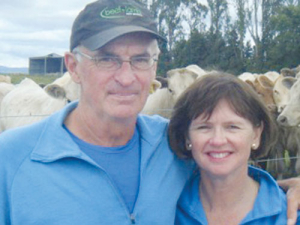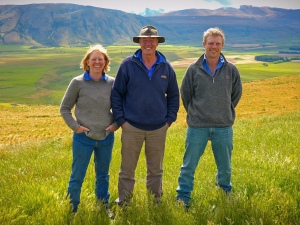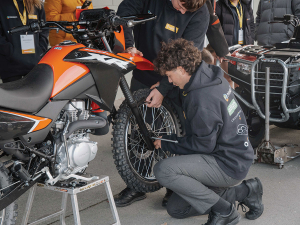He spoke at a Kaipara field day late last year.
Two days before the field day, Barton says the first unit load of cattle to be exported to Japan was killed. Another unit load was due to be killed the following week. They were working in with a free range pork farmer in the South Island and a free range chicken farmer and Taupo is providing the beef and lamb.
“We are filling a container every four weeks and sending it to Japan. We couldn’t do it on our own, but there’re 300 pigs in the container with our cattle.
“The Japanese have visited our farm several times; they visited the processor we use.
“I couldn’t get over them wanting the whole Taupo story; it is part of the brand and you’ve got consumers in Japan willing to pay more than for any other beef because of the issue of the lake,” he explained. Most of those people will never come to New Zealand and they will never visit the lake.
“To me that was the acid test of this Taupo beef project we started. Would consumers overseas value this issue? And they surprisingly did.”
The beef the Taupo group are selling to Japan retails 20% higher than any other beef sold in Japan except for Wagyu.
Barton says ‘Taupo Beef and Taupo Lamb – Grown Right Here’ was launched to see if consumers would pay a premium based on the efforts farmers had made to clean up the lake and to recoup some of the costs of environmental stewardship. They have supplied to local restaurants and selected supermarkets with good success.
“But that wasn’t going to test this model,” Barton says. “We needed to know if people outside Taupo would value what we’d done. In 2014 we started selling in Auckland and Wellington.”
They now sell throughout the North Island and some parts of the South Island.
Living under the nitrogen cap means Barton and other Taupo farmers send monthly stock returns to the regional council.
“That’s how they monitor whether we are staying within the rules and under the cap,” he says. “We decided we needed something that told our consumers we were doing the right thing by the lake – not just flapping our arms and saying we were sustainable.”
They wanted to see if consumers would value their having come up with a model to protect the lake in perpetuity.
“We approached the council and asked would they be willing to provide a tick or a certification based on the auditing they are doing of each farm in the catchment so we could use that to verify our claims to customers,” Barton explained.
“It took two years of negotiating because regional councils are very risk averse and they don’t like certifying any commercial activities. But to their credit they did,” he added.
“That tick is on every pack of meat we sell. The council website carries information on the auditing of each farm so it provides that level of certainty.
“Customers have told us they don’t want antibiotics and growth hormones and it has to be certifiably grass fed. What we have added is ‘no imported feed supplements’ – certainly no palm kernel.”
However, they have written into the legislation on the cap that animal welfare will supersede lake protection legislation.

















